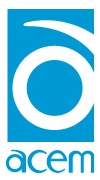 ACEM the European Association of Motorcycle Manufacturers has just published the latest edition of its newsletter.
ACEM the European Association of Motorcycle Manufacturers has just published the latest edition of its newsletter.
As would be expected, Jacques Compagne, ACEM Secretary General, in his introductory editorial, mentions how the industry is coping financially, not just in the European market but in the Global market as well
“ACEM reported encouraging signals coming from the EU market, but these are unfortunately far from hinting that recovery is at hand –the decline of the market is slowing down, but the EU market remains at -50% compared to pre-crisis levels.
Motorcycle manufacturers have positively fended off the impact of the crisis by investing in R&D and bringing new models to a changing market.
However, in the age of global commerce enterprises have started to seek out new markets where to export their products.
Having looked ahead to 2020 in terms of regulation, it is a fact that today European businesses face all sorts of obstacles in foreign markets, as governments enforce rules that prevent a level playing field.
Trade barriers and a lack of progress in harmonising global technical requirements represent a limit for motorcycle businesses in search of new markets, in order to remain competitive.”
Further in Jacque’s editorial he mentions (as the theme in the news letter) emission levels.
Emissions
At a recent conference held in Milan during the 71st International Motorcycle Show, ACEM presented the key findings of a report by EMISIA, which found that the projection of the contribution of L category vehicles (which are already at EURO 4) to the overall transport emissions, is fundamentally lower than expected.
This links to the introduction of the regulation for the approval and market surveillance of two- or three-wheel vehicles and quadricycles. Supporters will remember the debacle surronding this “Type Approval” regulation and the outcry concerning the supposed death of motorcycle due to the “banning” of modifications. Part of this regulation will introduce various EURO emission levels (reductions in emissions) that motorcycle manufacturers must comply with, right up to EURO 5 in 2020.
Jacques says, “This raises substantial questions regarding the cost-efficiency of EURO 5, and makes an in-depth investigation of its effects furthermore necessary, considering each category’s technical features and the larger context represented by the market.”
“With new provisions already limiting the emission levels of mopeds marks the first step in the roll out of the new requirements for L-category vehicles. ACEM welcomes this measure which updates EU legislation, making it possible to approve and sell EURO 3 emissions compliant mopeds and light on-road quadricycles.”
Our interpretation of this comment is that the manufacturers are complying. However, with further investigation about how much cleaner can the internal combustion engine get – and if there is no further improvement to be had – why force even more technical requirements on manufacturers if this will not provide any further benefit.
Remember the cost, because the industry is in business to sell their goods and make a profit – we don’t live in a universal Ashram – so any cost would either be passed to the customer (that’s us!) or absorbed by the manufacturers – this could mean less competition with more manufacturers going to the wall.
Globally – Represented
Still on a theme of global issues , the ACEM newsletter features a piece on IMMA, the International Motorcycle Manufacturers Association.
“IMMA joins UN’s Road safety collaboration. The United Nations Road Safety Collaboration (UNRSC) is an informal consultative mechanism whose members are committed to road safety efforts. The World Health Organisation acts as coordinator on road safety issues. IMMA, the International Motorcycle Manufacturers Association, committed to support the UNRSC road safety efforts, in particular with regards to the implementation of the recommendations of the World report on road traffic injury prevention. IMMA will act as a facilitator fostering international cooperation between UN agencies and the motorcycle industry”
On the IMMA website at www.immamotorcycles.org they explain that they represent, “the combined skills and interests of the Powered Two Wheeler industry (PTWs) in the world” with their membership consisting of, “National Industry Associations representing their PTW industry in Australia, Asia, Canada, Europe, India, and the United States who account for production of nearly 30 million PTW units per year.”
Apart from now having a place at the United Nations Road Safety Collaboration (UNRSC), they attend all the meetings of the World Forum for Harmonization of Vehicle Regulations (WP.29) at UNECE (United Nations Economic Commission for Europe) and the associated expert groups that develop individual technical regulations, which are now forming more and more part of EU technical regulations. We assume that IMMA, having previously taken part with their representative, also still attend the Working Party on Road Traffic Safety (WP.1) at UNECE.
Thus the manufacturers are well placed to put their positions and “fight” for that position where it matters and at Right To Ride we have witnessed the industry in Europe and at the UNECE arrive in force at meetings with experts and specialists to put their positions across.
This a position of representation that we as riders can only dream about, whether in Europe or globally and the small but important representation that we once had at the UNECE, appears to have been lost – why is this? Because the Federation of European Motorcyclists Associations (FEMA) gave that “global” privilege away!
In the meantime, ACEM is addressing the need for a global vision on regulations and international trade at its 10th Annual Conference, “A Global Vision for the Powered Two Wheeler Market”.
The Conference will be held in Brussels on the 29th of January 2014.
Leave Comments on Right To Ride EU – Click Here
Original Source – ACEM – Click Here
ACEM Newsletter Snippets
A Global Vision for the Powered Two-Wheeler Industry – 10th ACEM Annual Conference
L-category vehicles included in Periodic Roadworthiness Tests
European PTW market: -14% in October
Appropriate funding is needed to establish EURO 5 finds out EMISIA Study
IMMA joins UN’s Road safety collaboration
Technical Officer: new appointment
Original Source – ACEM – Click Here


